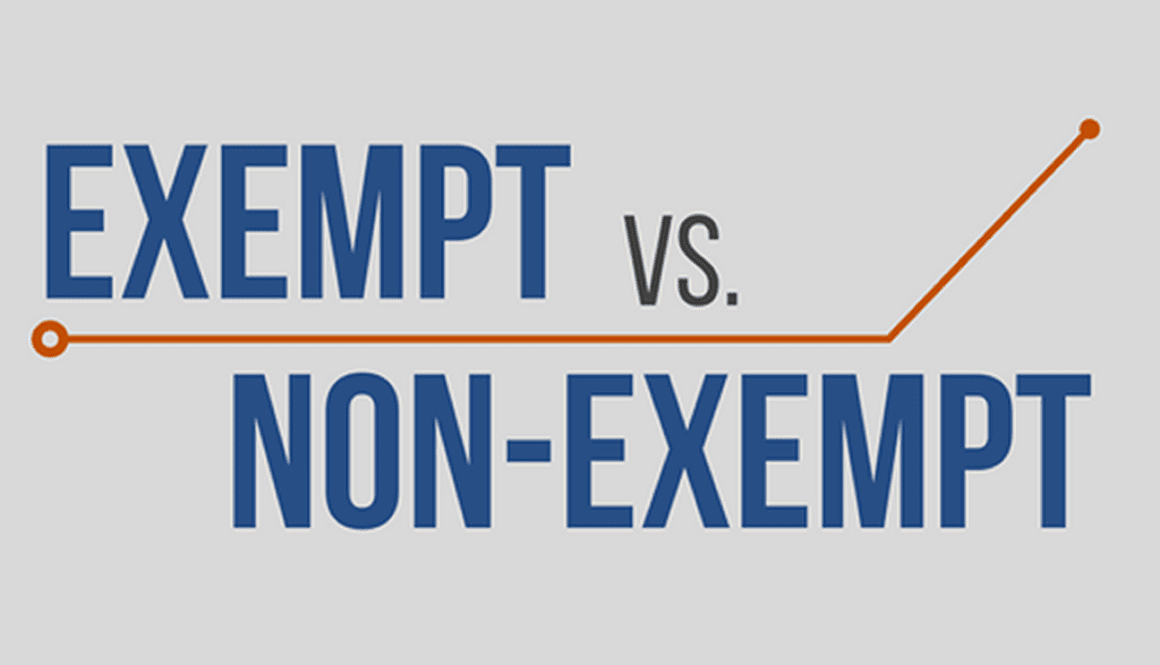Exempt or Nonexempt? That is the Question!
For many business owners, categorizing employees as exempt or nonexempt is a challenge. Misclassification is risky, so understanding what the law requires and how to comply is key. While the terms ‘exempt’ and ‘nonexempt’ can be confusing, they simply denote whether or not an employee is ineligible (exempt) or eligible (nonexempt) for overtime pay. These are more commonly referred to as salaried workers (exempt) and hourly workers (nonexempt).
Exempt workers receive the same pay regardless of the number of hours they work in a pay period. Nonexempt workers’ wages are based on the number of hours worked. Generally speaking, for hourly (nonexempt) workers, any time put in over 40 hours per week is required to be paid overtime wages (time-and-a-half for the excess hours) based on the federal Fair Labor Standards Act. The FLSA also sets the federal minimum wage.
However, it is important to note that in some states (California included), overtime pay is also required for hours in excess of 8 per day, whether or not the employee puts in a 40-hour workweek.
Defining exempt vs. nonexempt
There are two tests required by law to determine whether an employee should be classified as exempt or nonexempt. These are the Duties Test, and the Salary Test:
Duties Test for Exempt Workers
Under the FLSA, three main categories of workers are considered exempt from overtime pay:
- Executive: these employees’ primary duty is managing the company or a department. They direct at least two full-time employees and have hiring/firing authority.
- Administrative: these employees perform office or non-manual work directly related to the management or general business operations, and exercise discretion and independent judgment with respect to matters of significance. The administrative exemption is what most businesses assume the majority of their exempt employees fall under. However, this is a common mistake, and must be discussed with your HR consultant or in-house HR department.
- Learned Professionals: these employees perform work requiring advanced knowledge, requiring consistent exercise of discretion and judgment. Their knowledge must be in a field of science or learning and is typically acquired through specialized intellectual instruction.
- There are other categories of exempt workers, including computer professionals and outside sales
- Note: Employers in California may be subject to additional duties’ test
Salary Basis Test for Exempt Workers
The Salary Basis is the next test to determine whether an employee is exempt. New minimums are set every year. For January 2020:
Executive, administrative and professional employees must be paid:
- no less than $684.00 per week on a salary basis – annually: $35,568.00
- For California employers:
- Most exemptions must earn twice the state minimum wage, or a minimum of $54,080.00 for employers with more than 26 staffers, and $49,920.00 for 25 or less.
Many states have higher salary thresholds or more detailed duties’ tests. If there are conflicts, employers must meet the level most beneficial to the employee. Be sure to speak to your HR consultant/HR department to ensure that you are meeting the required minimums as of the date you are classifying the employee as exempt.
Exclusions Under the Law
In some states, highly compensated employees are exempt from overtime pay. Under federal guidelines, an employee who earns $107,432.00 or more annually, including at least $684.00 weekly on a salary or fee basis, and who performs office or non-manual work while routinely performing at least one of the exempt duties or responsibilities of an exempt executive, administrative or professional employee, is excluded under federal guidelines. This highly compensated exemption does not apply under California, New York and Pennsylvania law.
Outside Sales representatives may also be exempt from overtime pay. These employees must be customarily and regularly engaged away from the employer’s place of business. Other requirements may apply.
Some Inside Sales employees who earn commission may be exempt from overtime pay if the following standards are met:
- hourly rate exceeds one and one-half times the applicable minimum wage for every hour worked in a workweek in which overtime hours are worked
- more than half the total earnings in a representative period consist of commissions.
Most inside salespeople do not fall under this exemption. Furthermore, most are still eligible for meal and rest break requirements. Be sure to consult with your HR consultant or in-house HR department to ensure that you are meeting all the proper guidelines.
Penalties for misclassification
Improperly classifying an employee can be risky for business owners. Federal and state Departments of Labor can require back pay recovery and impose fines and penalties if they believe the misclassification was a willful violation of the law.
With new minimum wage laws in effect, and new thresholds for exempt status, employers must be thorough in determining employee classifications. If you have a question about categorization, contact the local Wage & Hour Division office or check their website for additional information. You are also welcome to contact your helpful People Person team, at info@peoplepersonhr.com.
